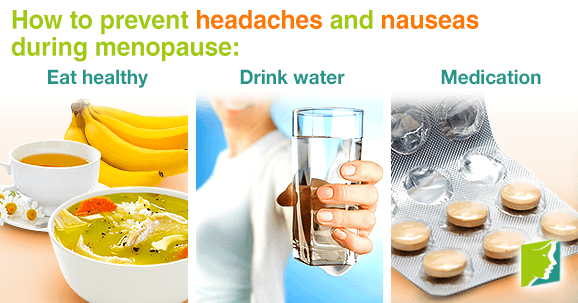Headaches and nausea are common symptoms women experience, and can be linked to things like poor diet and hormone fluctuations. Women are five times more likely to experience headaches than men, and are more vulnerable to increased frequency and intensity of headaches as they approach menopause. Nausea can be described as general discomfort and queasy feeling of the stomach, with a sensation of possible vomiting. These are common symptoms and typically not a cause for alarm, but if symptoms worsen or persist, contact a doctor as soon as possible.
Headaches
Tension headaches are the most common type of headaches, and are defined as the constant, dull headaches that typically do not last more than a few hours. Migraine headaches are much more severe, and are characterized by a recurrent, throbbing pain that starts on one side of the head. Migraines can last anywhere from a few hours to a few days.
Although hormone imbalance is the main cause of menopausal headaches, there are other outside triggers that can cause them. Triggers that should be avoided include excessive alcohol or caffeine, lack of sleep, skipping meals, dehydration, stress, lack of exercise, and poor posture.
Nausea
Nausea is characterized as general discomfort and queasy feeling of the stomach, usually accompanied by the feeling of needing to vomit. The sensation can last anywhere from a few minutes to a few hours. When feeling nauseous, it is helpful to think back to what you ate or any other reasons for feeling nauseous.
There are various causes of nausea, which can range anywhere from motion sickness, blocked intestines, viral infections, medicinal side effects to headaches or food poisoning. Other triggers of nausea that should be avoided are excessive amounts of alcohol or coffee and spicy or fried foods. If nausea persists for more than 24 hours, contact a physician.
Should I Be Worried?
Headaches and nausea should not be a cause for alarm; however, if they persist and worsen, you should contact your doctor as soon as possible. If you have a sudden and excruciating headache alongside nausea, or a sore neck and fever with nauseous feelings, visit your doctor or the emergency room as a matter of urgency.
Managing Headaches
Eat healthy
Eating small, healthy meals every few hours is recommended to prevent low blood sugar, which can cause headaches. Bland foods like unbuttered bread, rice, chicken soup, and bananas are easy to digest and mild on sensitive stomachs. Drinking ginger tisanes or chamomile tea is an effective, natural way to settling an upset stomach - and while some claim ginger ale can be used for the same purpose, it's important to remember fizzy or carbonated drinks can irritate the stomach lining. Over the counter medication like chewable or liquid antacids is also an effective method of treating nausea, because it coats the stomach lining and neutralizes stomach acid.
Drink water
Drinking plenty of water, eating small healthy meals often, exercising regularly, and reducing stress are all beneficial ways to prevent headaches.Drinking plenty of water is also important to preventing nauseas during menopause.
Medication
If the above methods are ineffective, it may be time to try over the counter medicine like aspirin, ibuprofen, or acetaminophen. These drugs help stop the migraine in progress and reduce inflammation.
Headaches and nausea are common symptoms that affect women, especially when going through the menopause transition. While hormone fluctuations are the primary cause, there are other triggers like poor diet, stress, food poisoning, and dehydration. It is important to know the common causes and treatment options in order to effectively prevent them.
Sources
- National Health Service UK. (2013). Hormone headaches. Retrieved August 28, 2014, from http://www.nhs.uk/livewell/headaches/pages/hormonalheadaches.aspx
- National Institutes of health.(2013). Headache - danger signs. Retrieved August 28, 2014, from http://www.nlm.nih.gov/medlineplus/ency/patientinstructions/000424.htm
- Office on Women's Health. (2012). Migraine fact sheet. Retrieved August 28, 2014, from http://www.womenshealth.gov/publications/our-publications/fact-sheet/migraine.html#n




